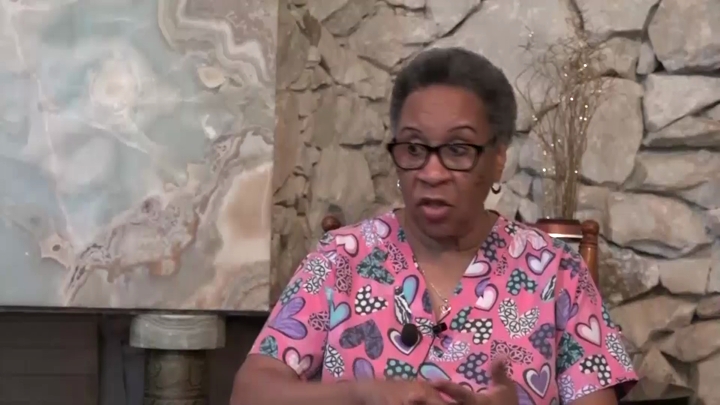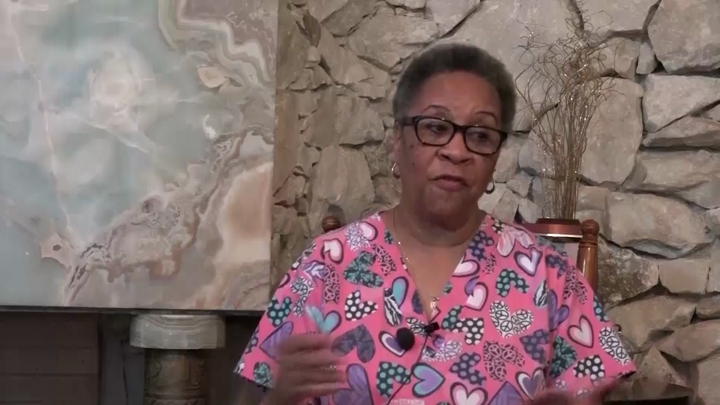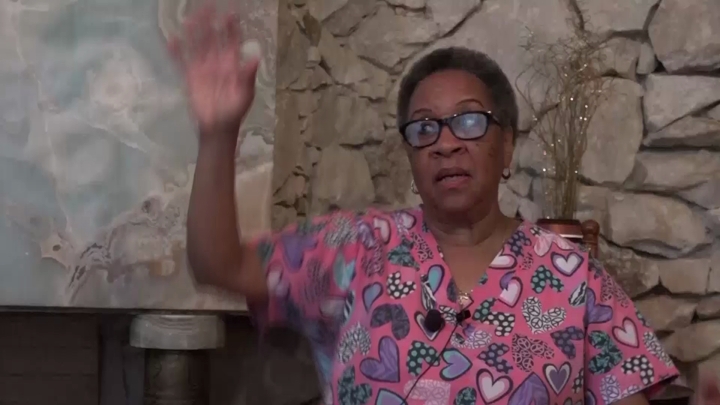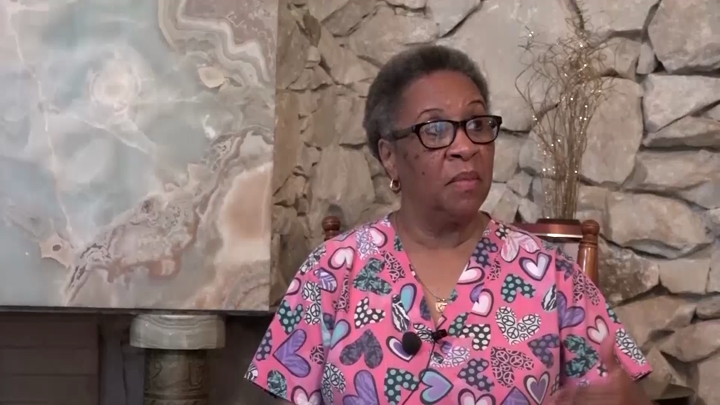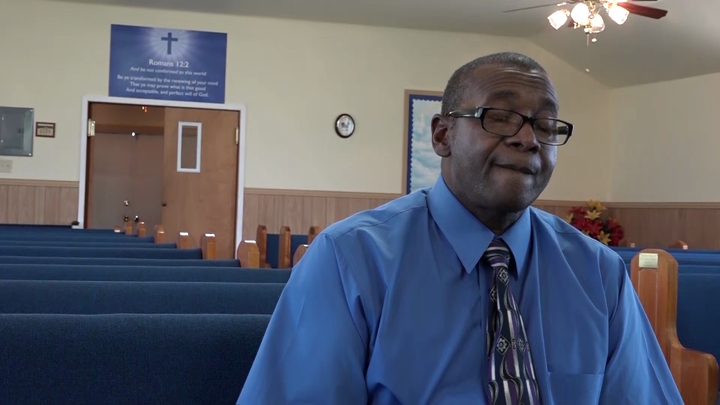Abdullah / After the Marches
sign up or sign in to add/edit transcript
Helena Abdullah: They were just mad young black men and that was their way of getting back at people. Throwing rocks. Throwing cocktails. Interviewer: What was the community’s response to that? Helena Abdullah: They were upset because it could have ended up poorly for us. Someone could have really gotten hurt. Luckily, thank God up above, nobody really really got hurt, but it could have been worse. Interviewer: The last march was planned for the summer. Why was this march planned? Helena Abdullah: It was to kind of finalize the end of talking about the change. At the end of this march, we were going to see what kind of change was happening in Nacogdoches. Of course, since we didn’t do it—some things were beginning to change. We did have some meetings. We ended up going to Dallas and meeting some people up there, strategizing that if they didn’t start putting people with some of these buildings, if they didn’t start opening stores up to blacks, putting them in places where they had a good paying job, how long we were going to continue to the boycott. The boycott, I’m pretty sure it went most all of the summer, but I think—I’m not positive—by December it may have stopped. Interviewer: So, it went from what time to what time? Helena Abdullah: I think it went from the beginning of the summer. Interviewer: Of 1969? Helena Abdullah: Uh huh. To probably October or November. For downtown businesses, that many months of not getting any sales from blacks, that’s a long time. That’s a lot of revenue. Interviewer: At that time what percentage of the population were blacks in Nacogdoches? Helena Abdullah: I couldn’t give you that because I don’t know it, but I do know everybody shopped downtown. Nobody went out of town to shop. Everybody because they walked downtown, the people from the rural areas came downtown. Nobody even from the rural areas came downtown. Now at the beginning of the boycott there were some people that came from like Sandhill and Pine Flat places, because they were coming to get their monthly commodities. We were upset that they came, but after that they said well we got to get our flour, we got to get our sugar, we got to get our supplies. They didn’t come back until the boycott was over. Interviewer: So, the third march, by that time, had people started getting jobs in these previous places? Helena Abdullah: A few. It was beginning to open up and by that time the atmosphere was changing somewhat. There was a lot of things going on nationwide, but again, I was getting a little bit of pressure from aunties and people out of town. Girl, you know what they’re doing to people and you’re a girl and you don’t have the backing of a lot of people. It was kind of a novelty, it seemed to be, for a lot of people in the community. By the time the last march was dispersed, and we didn’t do it, and then the meetings and things, we started working on things that were more geared towards talking to people, dialog. No more marches. We were getting ready to stop the boycott, but dialoging. OK, who are you going to hire here? Where are you going to hire somebody here? How many people are you going to put here? Start doing those type of things. Interviewer: Do you think without the marches, you wouldn’t have those opportunities for dialog? Helena Abdullah: It would have taken a long time. A long time because the powers that be here were not interested before the marches and before the boycott. They were totally not interested. The only place people worked, like at Lone Star, my daddy worked at Lone Star. He worked in there where he had to pick up those big heavy sacks. Not in a mill where they’re sewing up the sacks, or where he was working a conveyor belt. He did the heavy jobs. My mother did work in the Memorial Hospital because she was a nurse, but there weren’t a lot of meaningful jobs if you weren’t a teacher around town. The man that I knew that worked at Superior Savings was a janitor, the only other black. The lady that worked up at—its Bankcorp South now, but it was Fredonia Bank—my cousin, she cleaned up. The people who worked in these places were the cleanup crew. No tellers. No high school graduates. We did have some people that graduated from Massey’s to go and apply for jobs around town. They didn’t get them. Good grades from Massey’s Business College—now it was Massey’s Business College from downtown Nacogdoches—but they didn’t get any jobs. So that was one of the things we wanted some change in. If they’re going to your school, the school should make sure they get a job someplace. At least help them somehow. Interviewer: When did Mickey McGuire leave the area? Helena Abdullah: After his jail stint. He stayed around for a little while, but he wasn’t necessarily in the mix for the strategizing and the dialog because he was more of a Panther type. Let’s get out there and do this. We were kind of trying to get past that. Interviewer: Die that down. Helena Abdullah: We were trying to die that down and get past that for some real dialog to effect some real change that was going to be lasting, that was going to change the way people looked at us and we looked at other people and how we have talents in our community. Take our talents. Use our talents. We can do other than cleaning a floor and cleaning a toilet. We’ve got some good minds in our communities. It was slow to come but it did come. Interviewer: Do you think the reaction to the third march kind of also motivated y’all to change up the things you were doing? Helena Abdullah: It was a wake-up call as to how dangerous it was becoming for us. At that point, my mother said you are not marching anymore. Now the first and second march was OK, but mother put her foot down. That’s it, because if they’ll get on rooftops and wait for you guys, then all they’ve got to say—they can have somebody to break a window or to do something, knock out a car window and start shooting at y’all. You can’t continue doing it. I’m done with you and your marching. I think the other, Dr. Stevens from SFA, and I wish I could remember this other professor that helped us, we had begun to have some dialogs about that. The youth wanted another march, but they said let’s talk first, let’s start opening some conversations with these people and see what we can get done.
| Interview | Interview with Helena Abdullah |
| Subjects | Family › Marriage |
| Religion › Religious Denominations | |
| Media | |
| Direct Action | |
| Direct Action › Marches | |
| Student Activism | |
| Student Activism › Sit-ins › Student Demands for Jobs | |
| Direct Action › Protests | |
| Tags | McGuire, Mickey |
| Stephen F. Austin State University | |
| sign up or sign in to add/edit tags | |
| Interview date | 2016-06-30 |
| Interview source | CRBB Summer 2016 |
| Interviewees | Abdullah, Helena |
| Interviewers | Howard, Jasmin |
| Duration | 00:07:14 |
| Citation | "After the Marches," from Helena Abdullah oral history interview with Jasmin Howard, June 30, 2016, Nacogdoches, TX, Civil Rights in Black and Brown Interview Database, https://crbb.tcu.edu/clips/2442/after-the-marches, accessed February 24, 2026 |


